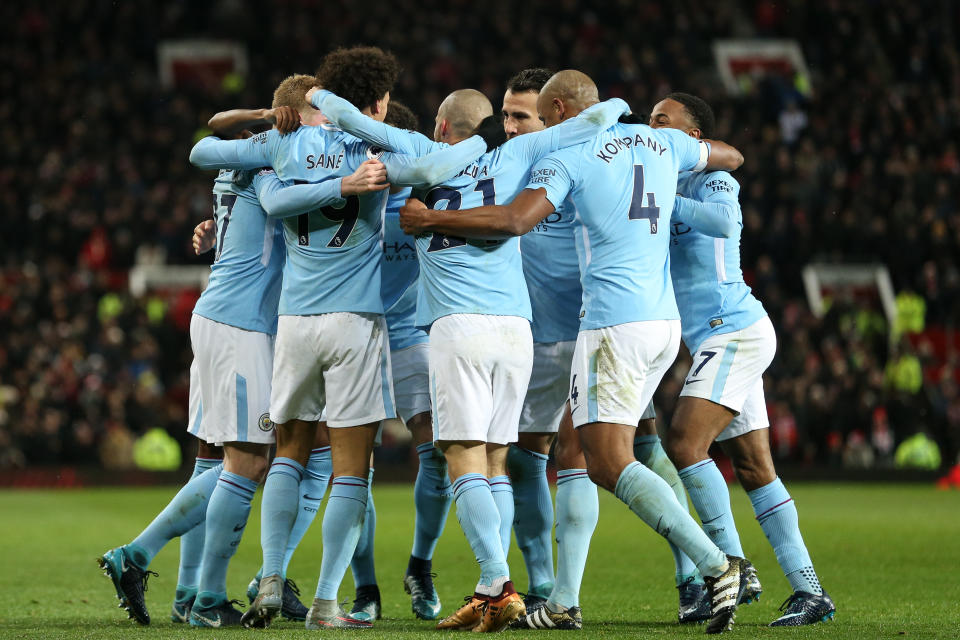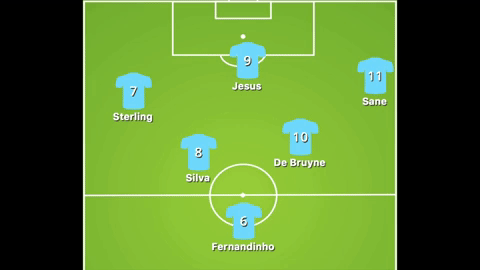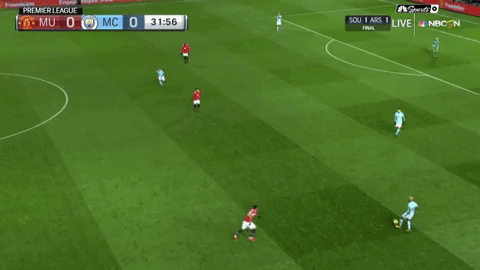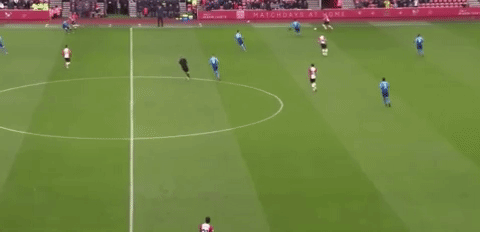2017-18 Premier League DARTS, Week 16: Is the title race already over?
Welcome to Premier League DARTS, FC Yahoo‘s weekly EPL column that will run every Monday morning. Why “DARTS”? Because Henry Bushnell will recap the weekend’s biggest games with Discussion, Analysis, Reactions, Takeaways and Superlatives. All of that is below. But first, a brief intro …
Brighton. Bournemouth. Liverpool. Watford. Crystal Palace. Chelsea. Stoke. Burnley. West Brom. Arsenal. Leicester. Huddersfield. Southampton. West Ham. And now Manchester United.
The list of Manchester City’s victims keeps growing. And so does its lead atop the Premier League.
You have surely heard the stats, but here they are again. City has won 14 games on the trot, a single-season English top-flight record. It has equaled Arsenal’s mark across multiple seasons, and can break it with victory at lowly Swansea City on Wednesday.
Three points in Wales would leave only Tottenham, Everton and Newcastle unharmed by City’s brilliance. They would extend the best start to an English top-flight season to 49 points out of a possible 51. They would continue to stretch the limits of belief.
But the pressing question need not wait. It does not require a win over Swansea. All it needed was City’s 2-1 win over United on Sunday to reach the tips of tongues around the world – and to become the lead for Premier League DARTS, week 16 …
1. Is the title race over?
FiveThirtyEight now gives Manchester City a 91 percent chance to win the 2017-18 Premier League title, a number that could hardly be any higher on Dec. 11. Not only has City’s success been unparalleled; all five potential challengers have gnawed away at one another. Each has won at least one intra-top-six matchup. Each has dropped at least four points in those matchups, and as many as nine. That’s how the 11-point lead has developed.

The reason the 91 percent isn’t higher is the perceived strength of those challengers. Bayern Munich and PSG are 98-percent favorites in their respective leagues despite slimmer point margins. Any City doubt stems from the possibility of a second-half run like Tottenham’s a year ago. The problem is that none of the challengers appear ready to put one together.
2. Only two of the top six won this weekend …
City and Tottenham. That’s all. United fell in the derby, Chelsea kicked off the weekend with a loss at West Ham, and Liverpool and Arsenal slumped to draws.
We can debate the merits of the five teams, and the likelihood that each puts together a prolonged, City-esque winning streak. But beyond United, at this point, the discussion is futile. FiveThirtyEight projects City to finish with 96 points. Let’s say City misses that mark, and only gets to 90 – only pulls 2.0 points per game the rest of the season. For third-place Chelsea to win the league in that scenario, it would have to take at least 2.64 points per game – also known as at least 19 wins, 2 draws and a loss from its final 22 games.
If City hits its 96-point projection, Chelsea would have to win out. So, uh, yeah … not happening.
Oh, and by the way, City might exceed that target. It’s pretty darn good.
3. City’s midfield interchanges and overloads
It’s both easy and natural to criticize Jose Mourinho and Manchester United for 45 minutes of football at Old Trafford with 25 percent possession. It’s simple to say they parked the bus in Sunday’s first half. And to an extent, it’s fair. But on the other hand, what else were they supposed to do?
They did attempt to play on the break every now and then. They weren’t completely pinned back. The real issue, especially over the latter two thirds of the first half, was the space which City’s midfielders had available to them. That was one of the more surprising aspects of the half. And it was most certainly Guardiola’s doing.
City’s front five were even more fluid than usual. Leroy Sane spent much of the afternoon attacking from the right touchline, but Gabriel Jesus, Raheem Sterling, David Silva and Kevin De Bruyne popped up in different areas and alignments. Here are just a few:

The interchanges between Sterling and Jesus were particularly intriguing. Sterling spent much of the first half as a central winger, with Jesus sometimes drifting wide left. Sterling’s movement and presence haunted United. It gave City a 4-v-3 in the center of the park – Fernandinho, De Bruyne, Silva and Sterling vs. Jesse Lingard, Nemanja Matic and Ander Herrera. United’s center backs were hesitant to step, wary of getting pulled out of position, but that allowed Sterling to tug on the two defensive midfielders and City to find relatively simple routes around them.
In the GIF below, watch how Herrera sticks to Sterling. Then watch how, right when Marcus Rashford passes off De Bruyne to Matic on the United left, Silva becomes free. And how that provokes a rotation, leaving Herrera and Matic outnumbered:

One of the many reasons the Citizens won’t be caught at the top of the table is their flexibility. Guardiola has seemingly settled on a first-choice 11, but those 11 can throw so many different looks at opponents. And they’re so talented as individuals. They’re therefore going to be very difficult to beat.
4. Big Six problems: Chelsea and Cesc
Back in August and September, we dedicated multiple chunks of early DARTS columns to Cesc Fabregas, and to his utility against the bottom half of the league. Saturday’s game at West Ham, in that sense, should have been tailor-made for him. And in a way, it was. It was begging for a deep-lying playmaker to dictate play and pick progressive passes. But it didn’t have one – despite Fabregas being on the pitch.
Fabregas played in a midfield three with N’Golo Kante and Tiemoue Bakayoko, but, strangely, not as the pivot. Until Antonio Conte went to a 3-4-3 after halftime, Kante sat in the hole with Fabregas and Bakayoko in front of him. Kante’s holding role is likely a counterattack-prevention mechanism, but with Chelsea behind inside six minutes, Conte was far too slow to adjust. He spent 40 minutes with Kante on the ball instead of Fabregas. The Blues eventually manufactured enough so-so chances to deserve a point, but they didn’t get it. And with City the pace-setter, a point wouldn’t have been all that useful anyway.
5. Big Six problems: Arsenal and Per
Per Mertesacker’s first 10 minutes at St. Mary’s were very, very hard on the eye. And that’s a shame, because Mertesacker is a great human being, and was, once upon a time, a top international center back. At 33, he no longer is, and the Gunners are a tad fortunate he didn’t cost them more than he did.
He was clearly at fault on Charlie Austin’s goal. As he stumbled to his knees trailing Dusan Tadic, he looked like a man whose footballing brain hadn’t quite come to terms with his physical capabilities.
Two minutes later, he could have been at fault on a second goal. He was caught in no-man’s land, in between stepping to Tadic and tracking Austin’s run. (He should have done the latter; Monreal went with Tadic.)

Mertesacker has been kept out of Arsene Wenger’s back three by Laurent Koscielny, Nacho Monreal and Shkodran Mustafi, and when Mustafi returns from injury, Mertesacker will return to his reserve role. But if injuries reemerge, the German’s performance on Sunday will surely give Wenger something to think about the next time he considers a replacement along his back line.
6. Big Six problems: Liverpool and luck
There’s a silly postgame narrative that’s been forged on Merseyside that Sam Allardyce’s Everton frustrated Liverpool – that the Toffees deserved their point. Frankly, it’s nonsense.
xG map for the Merseyside Derby.
Mel Brooks said, "Tragedy is I cut my little finger. Comedy is when you fall in an open sewer and die." pic.twitter.com/vbYOAsp525
— Caley Graphics (@Caley_graphics) December 10, 2017
Also falling into the category of nonsense are any thoughts that this was a correct decision:
Postgame manager rants are often misguided. Jurgen Klopp’s on the penalty was anything but. He’s actually spot on:


